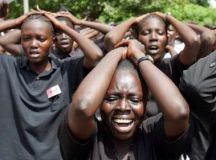Mournful songs, prayers of peace at funeral of John Garang
By RODRIQUE NGOWI
JUBA, Sudan, Aug 6, 2005 (AP) — A black-clad choir, many with tears streaming down their cheeks, sang a mournful song of peace Saturday at the start of the funeral of southern leader and First Vice President John Garang de Mabior, who was killed last week in a helicopter crash.

|
|
Religious choir members sing and cry during the funeral service for rebel leader and first vice president John Garang in Juba, southern Sudan August 6, 2005. (Reuters). |
Garang’s coffin, draped in Sudan’s national flag, sat on a wooden dais in front of the stone cathedral where thousands had gathered for his funeral. In past days, the coffin had been covered by the flag of southern Sudan as it made a tour of towns so Garang’s supporters could play their last respects.
“He stopped the war, he stopped the violence,” one bishop said in a prayer beginning the service, urging Sudanese to continue toward peace.
The choir’s song recalled the long peace negotiations Garang held with the northern government on behalf of his people. The head of that government, President Omar al-Bashir sat on a couch under a tent near the dais. Nearby was his soon-to-be new first vice president, Salva Kiir Mayardit, Garang’s successor as leader of the Sudan People’s Liberation Movement.
Heads of state of South Africa, Kenya, Ethiopia and Tanzania were also in the audience, as well as a number of other foreign diplomats. The Ethiopian president, a close friend of Garang’s who did not attend, sent a huge wreath with a thick black ribbon, which sat next to the casket.
Soldiers of the Sudanese army and Garang’s former rebel movement stood guard on the cathedral grounds. A massive security presence filled Juba due to the host of national and foreign dignitaries who attended the funeral. Members of the elite presidential guard manned high vantage points; in the city, thousands of soldiers were deployed, some stationed every 10 meters (yards) on keys roads.
As prayers were read and hymns sung, even some of the religious leaders in attendance recognized the historic moment. Two bishops who were sitting on the steps of the church snapped photographs of the crowd.
More than 200 priests, pastors, vicars, deacons and bishops had come to Juba from other parts of Sudan to participate in the multidenominational funeral service.
“Our great hero is with us,” a priest said over a loudspeaker just before the coffin was carried down the path to the stone cathedral. He urged the thousands of mourners to stay silent in respect. “We would like to thank almighty God for giving John Garang to us.”
In the past two days, Garang’s body was flown from town to town in the south so his many supporters could pay final respects to the leader who fought for two decades for southern equality.
Saturday was declared a national holiday so all Sudanese could follow the funeral.
In Juba, black banners were hung throughout the city, reading: “Dr. Garang, your physical body is gone, but your inspiration and vision live with us forever.” Radio programs played messages of condolences.
Garang and 12 others were killed July 30 in a helicopter crash that the Sudanese government and SPLM say was an accident, though an investigation is planned. The United Nations, Kenya and Uganda — who provided the helicopter — were participating in the probe.
Ugandan President Museveni, a close friend of Garang, told mourners in the southern town of Yei on Friday that the cause of the helicopter crash that killed Garang was not clear.
“Some people say accident; it may be an accident, it may be something else,” Museveni said. “Either the pilot panicked, either there was some side wind or the instruments failed or there was an external factor.”
The Sudanese government responded angrily to Museveni’s comments, saying that raising possibilities of the cause would only damage the investigation.
“We are making efforts to investigate the saddening incident and we have already started our investigations by setting up a technical committee and we hope that all parties, especially Uganda, would stop issuing statements which are not based on facts,” Information Minister Abdel-Basit Sabdera told the official Sudan News Agency.
Apparently seeking to avoid confrontations at the funeral, Museveni changed his plans at the last minute and sent his defense minister to head Uganda’s delegation.
The SPLM also said it would wait for the investigation.
“Until the investigation results are out, we are not going to point any fingers in any direction,” said SPLM spokesman Yasir Arman.
The helicopter’s black box has been found but not yet studied, Sabdera said.
Garang died just three weeks after he was sworn in as first vice president in a unity government established under a peace deal ending 22 years of war between the Arab Muslim-dominated government and rebels in the African Christian and animist south. He also was installed as the president of southern Sudan’s autonomous government.
Garang’s death and the days of violent clashes that followed raised fears about the stability of the peace deal struck in January. His charismatic — and sometimes strong-handed — leadership had been seen as essential to making the agreement work.
The government and the SPLM have stressed repeatedly that they are committed to the peace process. In a show of continuity, Kiir was quickly named Garang’s successor in the movement and will be sworn in next week as Sudan’s first vice president and president of the south.
The accord provided for sharing of power and wealth with southerners. In six years, southerners are to have a chance to vote on secession.
